|
|
|
Sort Order |
|
|
|
Items / Page
|
|
|
|
|
|
|
| Srl | Item |
| 1 |
ID:
091376
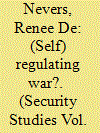

|
|
|
|
|
| Publication |
2009.
|
| Summary/Abstract |
Private security companies' growing participation in U.S. and international military missions has raised concern about whether the private security industry is subject to sufficient controls. Industry self-regulation is often proposed as part of a multilayered framework of regulations to govern PSCs. But what can self-regulation contribute to regulation of the private security industry? This matters because privatization in the security realm has moved beyond understandings of the proper breakdown of public and private functions concerning the use of force. This article assesses what self-regulation can contribute to the control of this industry and whether the private security industry lends itself to effective self-regulation. It concludes that the private security industry does not exhibit the capacity to adopt and implement effective self-regulation on its own. If self-regulation is to complement state and international regulation, participation in the design and oversight of self-regulation must be broadened beyond private security companies alone.
|
|
|
|
|
|
|
|
|
|
|
|
|
|
|
|
| 2 |
ID:
091790
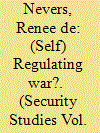

|
|
|
|
|
| Publication |
2009.
|
| Summary/Abstract |
Private security companies' growing participation in U.S. and international military missions has raised concern about whether the private security industry is subject to sufficient controls. Industry self-regulation is often proposed as part of a multilayered framework of regulations to govern PSCs. But what can self-regulation contribute to regulation of the private security industry? This matters because privatization in the security realm has moved beyond understandings of the proper breakdown of public and private functions concerning the use of force. This article assesses what self-regulation can contribute to the control of this industry and whether the private security industry lends itself to effective self-regulation. It concludes that the private security industry does not exhibit the capacity to adopt and implement effective self-regulation on its own. If self-regulation is to complement state and international regulation, participation in the design and oversight of self-regulation must be broadened beyond private security companies alone.
|
|
|
|
|
|
|
|
|
|
|
|
|
|
|
|
| 3 |
ID:
091791
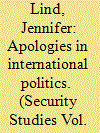

|
|
|
|
|
| Publication |
2009.
|
| Summary/Abstract |
This article examines the growing conventional wisdom that apologies and other acts of contrition are necessary for international reconciliation. I create and test a theory that connects a country's remembrance with that country's image-threatening or benign-in the eyes of former adversaries. I evaluate the theory in two post-World War II case studies: South Korean relations with Japan and French relations with Germany.
This article offers three major findings. First, it substantiates the claim that denials inhibit reconciliation. Japanese denials and history textbook omissions have elevated distrust and fear among Koreans (as well as Chinese and Australians). Second, although whitewashing and denials are indeed pernicious, the conventional wisdom about the healing power of contrition must be seriously reconsidered. Evidence from the Japanese and other cases suggests that contrition risks triggering a domestic backlash, which alarms former adversaries. Finally, there is good news for the prospects of international reconciliation: countries have reconciled quite successfully without any contrition at all. West Germany actually offered very little contrition at the time of its dramatic reconciliation with France; many other countries have restored close and productive relations without contrition. The best course for reconciliation is to remember the past in ways that are unifying, rather than divisive, and minimize the risk of backlash.
|
|
|
|
|
|
|
|
|
|
|
|
|
|
|
|
| 4 |
ID:
091377
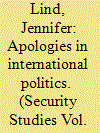

|
|
|
|
|
| Publication |
2009.
|
| Summary/Abstract |
This article examines the growing conventional wisdom that apologies and other acts of contrition are necessary for international reconciliation. I create and test a theory that connects a country's remembrance with that country's image-threatening or benign-in the eyes of former adversaries. I evaluate the theory in two post-World War II case studies: South Korean relations with Japan and French relations with Germany.
This article offers three major findings. First, it substantiates the claim that denials inhibit reconciliation. Japanese denials and history textbook omissions have elevated distrust and fear among Koreans (as well as Chinese and Australians). Second, although whitewashing and denials are indeed pernicious, the conventional wisdom about the healing power of contrition must be seriously reconsidered. Evidence from the Japanese and other cases suggests that contrition risks triggering a domestic backlash, which alarms former adversaries. Finally, there is good news for the prospects of international reconciliation: countries have reconciled quite successfully without any contrition at all. West Germany actually offered very little contrition at the time of its dramatic reconciliation with France; many other countries have restored close and productive relations without contrition. The best course for reconciliation is to remember the past in ways that are unifying, rather than divisive, and minimize the risk of backlash.
|
|
|
|
|
|
|
|
|
|
|
|
|
|
|
|
| 5 |
ID:
091380


|
|
|
|
|
| Publication |
2009.
|
| Summary/Abstract |
This article addresses the security challenge posed by laboratory research involving genetic modification of microorganisms that could be applied for both benign and malevolent purposes. The authors propose that, for biological arms control purposes, a global governance culture is required to manage the security risks inherent in such research while minimizing scientific opportunity costs
|
|
|
|
|
|
|
|
|
|
|
|
|
|
|
|
| 6 |
ID:
091794


|
|
|
|
|
| Publication |
2009.
|
| Summary/Abstract |
This article addresses the security challenge posed by laboratory research involving genetic modification of microorganisms that could be applied for both benign and malevolent purposes. The authors propose that, for biological arms control purposes, a global governance culture is required to manage the security risks inherent in such research while minimizing scientific opportunity costs.
|
|
|
|
|
|
|
|
|
|
|
|
|
|
|
|
| 7 |
ID:
091373


|
|
|
|
|
| Publication |
2009.
|
| Summary/Abstract |
Studies of counterterrorism have argued for the importance of bolstering, or "mobilizing," moderates in the confrontation with violent extremists. Yet the literature has not elucidated when states seek to mobilize moderates and marginalize extremists, how they do so, or when they prove successful. The received wisdom is that states should cultivate and strengthen moderate allies by reaching out to them. This approach, however, fails to grasp the political challenges confronting potential moderates, whose priority is to build and retain legitimacy within their political community. Inspired by network approaches, we maintain that moderates can more easily emerge when their political interactions with the authorities are relatively sparse. We further argue that the state's strategies, including crucially its rhetorical moves, can bolster the moderates' local legitimacy. At times, this will entail not reaching out to moderates but isolating them. Before moderates can be mobilized, they must be made, and the state's criticism, more than its love, may do much to help moderate political forces emerge. This article explains why mobilizing moderates is critical, when it is difficult, and how authorities can nevertheless play a productive role in moderates' emergence. We establish our theoretical framework's plausibility by examining two cases-India's ultimately triumphant campaign against Sikh extremists and Spain's gradual marginalization of Basque extremists. We then suggest what lessons these campaigns against ethnonational terrorism hold for the so-called War on Terror.
|
|
|
|
|
|
|
|
|
|
|
|
|
|
|
|
| 8 |
ID:
091374
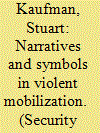

|
|
|
| 9 |
ID:
091788
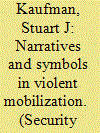

|
|
|
|
|
| Publication |
2009.
|
| Summary/Abstract |
According to symbolic politics theory, group fears and narratives of group identity that justify hostility are key causes of violent ethno-national conflict. In the Palestinian-Israeli conflict, widely accepted narratives on each side define group identity and group relations in ways that generate incompatible demands on Jerusalem, territory, refugees, security, and other issues. Historical memories of the Holocaust, the Nakba, and other tragedies generate fears of extinction on both sides, and stereotypes encourage beliefs on each side that the other responds only to force. These narratives enable hard-line leaders on both sides to manipulate emotive symbols to block compromise and escalate conflict. Thus the cause of both the failure of Palestinian-Israeli negotiations in 2000-01 and the simultaneous outbreak of the latest Palestinian-Israeli war lies in the irreconcilable demands that are rooted in each side's competing narratives of national identity.
|
|
|
|
|
|
|
|
|
|
|
|
|
|
|
|
| 10 |
ID:
091789
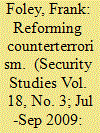

|
|
|
|
|
| Publication |
2009.
|
| Summary/Abstract |
This article seeks to explain why two states faced with a similar terrorist threat, perceiving it in a similar way, and drawing the same broad implications for their counterterrorist investigations, have nevertheless put in place significantly different types of organizational reforms in response to that threat. The study shows that although France and Britain have embraced a common preventive logic in the face of Islamist terrorism, the changes that they have made to the coordination of intelligence, law enforcement, and prosecution in that context have differed because of contrasting organizational routines and interinstitutional conventions in the two states. An analysis of the British and French cases shows that law enforcement can be preventive but that western states are likely to pursue different ways of bringing security agencies and the law together to prevent and prosecute terrorism. The organizational and institutional factors that give rise to such divergent practices have important consequences for the ability of a state to develop a coordinated operational response to terrorism and convict terrorist suspects of crimes in a court of law.
|
|
|
|
|
|
|
|
|
|
|
|
|
|
|
|
| 11 |
ID:
091375
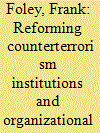

|
|
|
|
|
| Publication |
2009.
|
| Summary/Abstract |
This article seeks to explain why two states faced with a similar terrorist threat, perceiving it in a similar way, and drawing the same broad implications for their counterterrorist investigations, have nevertheless put in place significantly different types of organizational reforms in response to that threat. The study shows that although France and Britain have embraced a common preventive logic in the face of Islamist terrorism, the changes that they have made to the coordination of intelligence, law enforcement, and prosecution in that context have differed because of contrasting organizational routines and interinstitutional conventions in the two states. An analysis of the British and French cases shows that law enforcement can be preventive but that western states are likely to pursue different ways of bringing security agencies and the law together to prevent and prosecute terrorism. The organizational and institutional factors that give rise to such divergent practices have important consequences for the ability of a state to develop a coordinated operational response to terrorism and convict terrorist suspects of crimes in a court of law.
|
|
|
|
|
|
|
|
|
|
|
|
|
|
|
|
| 12 |
ID:
091378
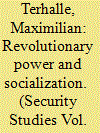

|
|
|
|
|
| Publication |
2009.
|
| Summary/Abstract |
Why do states stay revolutionary for so long? The question of why and how some political players of a country successfully pursue a revisionist strife against the status quo has neither theoretically nor empirically received systematic attention. I use a current policy issue, the crisis regarding Iran, as a single-case study to examine the issue. This article argues that answers are found in the interconnected realms of domestic politics and revolutionary ideas. In Iranian politics specifically, it is both the ideological conservative faction's occupation of key constitutional positions and pursuit of revolutionary ideas, which have caused the recurring and large degree of revolutionary zeal. In turn, this has had a significant effect on the extent of the Islamic Republic's socialization to regional and international politics
|
|
|
|
|
|
|
|
|
|
|
|
|
|
|
|
| 13 |
ID:
091792
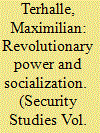

|
|
|
|
|
| Publication |
2009.
|
| Summary/Abstract |
Why do states stay revolutionary for so long? The question of why and how some political players of a country successfully pursue a revisionist strife against the status quo has neither theoretically nor empirically received systematic attention. I use a current policy issue, the crisis regarding Iran, as a single-case study to examine the issue. This article argues that answers are found in the interconnected realms of domestic politics and revolutionary ideas. In Iranian politics specifically, it is both the ideological conservative faction's occupation of key constitutional positions and pursuit of revolutionary ideas, which have caused the recurring and large degree of revolutionary zeal. In turn, this has had a significant effect on the extent of the Islamic Republic's socialization to regional and international politics.
|
|
|
|
|
|
|
|
|
|
|
|
|
|
|
|
| 14 |
ID:
091793
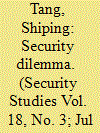

|
|
|
|
|
| Publication |
2009.
|
| Summary/Abstract |
Critically building upon the work of Herbert Butterfield, John Herz, and Robert Jervis, this article advances a more rigorous definition of the security dilemma. It demonstrates critical implications of the rigorously redefined concept. It examines several influential extensions and expansions of the original concept, showing that most have been inaccurate and misleading, and proposes remedies for correcting the mistakes. Finally, it identifies several areas of future research that may yield important new insights into the dynamics of the security dilemma.
|
|
|
|
|
|
|
|
|
|
|
|
|
|
|
|
| 15 |
ID:
091379
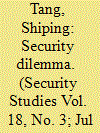

|
|
|
|
|
| Publication |
2009.
|
| Summary/Abstract |
Critically building upon the work of Herbert Butterfield, John Herz, and Robert Jervis, this article advances a more rigorous definition of the security dilemma. It demonstrates critical implications of the rigorously redefined concept. It examines several influential extensions and expansions of the original concept, showing that most have been inaccurate and misleading, and proposes remedies for correcting the mistakes. Finally, it identifies several areas of future research that may yield important new insights into the dynamics of the security dilemma.
|
|
|
|
|
|
|
|
|
|
|
|
|
|
|
|
|
|
|
|
|